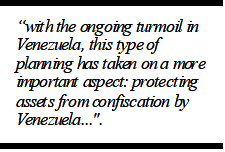PROTECTING ASSETS FROM VENEZUELAN AND OTHER CONFISCATION: IMMEDIATE ACTION NEEDED
2017 – OUR 25th YEAR OF PUBLICATION!
Volume XXIV • Number 2 • August – September 2017
INTRODUCTION.
We have previously discussed pre-immigration tax planning strategies for wealthy nonresident aliens wishing to move to the US (See, APN XX, No. 1). Today, with the ongoing turmoil in Venezuela, this type of planning has taken on a more important aspect: protecting assets from confiscation by Venezuela (and other governments of that type), regardless of whether one desires to immigrate to the US.
DISCUSSION.
Depending upon the goal of the person creating the trust (the “grantor”) – whether the goal is protecting assets from government confiscation, undertaking pre-immigration US tax planning, or both, the trust can be designed in a variety of ways. If protecting assets from confiscation is the sole objective, the trust design and its operational rules can be somewhat flexible. If the grantor is seeking tax benefits upon immigrating to the US, the trust design and operation – because of the huge tax benefits involved – will be quite a bit more stringent.
In either case, a Cook Islands trust will be at the core of the planning. If US tax benefits upon immigration are the goal, the trust must be established and funded (assets transferred to it) prior to the grantor becoming a US resident. Properly structured, such a pre-immigration trust can enable the grantor to become a US resident (or citizen) and entirely (and legally) avoid US estate tax (40%) upon the grantor’s death. In addition, as long as certain rules are carefully followed, the grantor can continue to enjoy certain benefits from the transferred assets. A financial form of eating your cake and having it too.
TECHNICAL NECESSITIES.
 A little technical background is necessary here. In order to effect the above exclusion from US estate taxation, we need a “completed transfer” for federal estate & gift tax purposes. Under the trust law in most jurisdictions, property transferred to a trust in which the grantor is also a beneficiary (remember “eating your cake and having it too”?) can be reached by the grantor’s creditors to the extent the grantor could possibly receive benefits from the trust. The IRS says, because of that, the transfer is incomplete for estate & gift tax purposes. Thus, in the usual case, a trust of which the grantor is also a beneficiary (as in a typical asset protection trust) will be included in the grantor’s estate for federal estate tax purposes (that is, subject to US estate taxation).
A little technical background is necessary here. In order to effect the above exclusion from US estate taxation, we need a “completed transfer” for federal estate & gift tax purposes. Under the trust law in most jurisdictions, property transferred to a trust in which the grantor is also a beneficiary (remember “eating your cake and having it too”?) can be reached by the grantor’s creditors to the extent the grantor could possibly receive benefits from the trust. The IRS says, because of that, the transfer is incomplete for estate & gift tax purposes. Thus, in the usual case, a trust of which the grantor is also a beneficiary (as in a typical asset protection trust) will be included in the grantor’s estate for federal estate tax purposes (that is, subject to US estate taxation).
SOLUTION.
Ok, we want to have an interest in the transferred property AND obtain a significant estate tax benefit. How can we accomplish that? The IRS, in several well-reasoned public and private rulings, has held that if a grantor establishes his/her trust in a jurisdiction whose laws will not permit the grantor’s creditors to reach trust assets (as the creditors would be able to in most jurisdictions as a result of the grantor being a discretionary beneficiary of the trust), that the transfer will be complete, and will be excluded from the grantor’s estate (not taxed) for estate tax purposes.
WHICH JURISDICTION?
Although the laws of several US states purport to restrict a creditor’s access to trust assets under the circumstances described above, there are numerous uncertainties in that regard (See, e.g., APN, Vol. VII, No. 1). However, we know that certain offshore jurisdictions will be effective to that end. To summarize: You can set up a properly structured trust in certain jurisdictions and be a discretionary beneficiary of your trust, and it will be excluded from estate taxation in your estate.
Do the assets have to be in the Cook Islands? The answer is: NO. Can they stay at your favorite broker? YES. Note that we have not mentioned anything about U.S. income tax. That’s because, even though the trust described above will not be subject to U.S. estate tax in the grantor’s estate, it will still be a “grantor trust” for U.S. income tax purposes upon the grantor immigrating to the US, requiring the grantor to report all trust income personally, absent certain sophisticated insurance planning within the trust (See, APN, Vol. XXIII, No. 3 for a discussion of these tax laws)
CONCLUSION.
The above discussion of US tax laws is only relevant if the grantor will immigrate to the US. If protection from confiscation is the goal without US immigration, those tax rules do not apply.
We work towards stopping others getting hold of your assets. Expert attorneys providing exceptional personalized service. Call us 305-447-0061 or simply send us a message using our contact page

